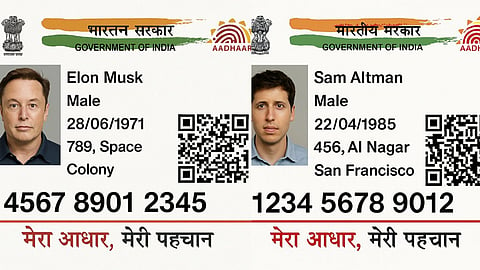ChatGPT: Elon Musk, Aryabhatta also have Aadhaar and PAN card?
The advent of advanced artificial intelligence tools like ChatGPT has revolutionized various sectors, offering innovative solutions and efficiencies. However, recent incidents have spotlighted the darker side of such technologies, particularly their potential misuse in creating counterfeit identification documents, raising significant security and ethical concerns.
Fake Aadhaar cards have been created through ChatGPT. In this, the fake Aadhaar cards of OpneAI CEO Sam Altman and Tesla owner Elon Musk have been revealed. Meanwhile, this type of fraud is not limited to Aadhaar cards only, it has come to light that many people have also used it to create fake driving licenses and PAN card photos.
AI-Generated Fake IDs: A Growing Concern
Reports have emerged indicating that individuals are leveraging ChatGPT's image generation capabilities to produce fake Aadhaar and PAN cards—critical identification documents in India. Screenshots circulating on social media platforms reveal users prompting ChatGPT to create replica documents, complete with fabricated names, addresses, and identification numbers. Notably, images depicting Aadhaar cards featuring prominent figures like OpenAI CEO Sam Altman and Tesla CEO Elon Musk have surfaced, highlighting the ease with which realistic-looking IDs can be generated using AI tools.
The concern is that Aadhaar card can be tracked. Facial data can be cross-checked through the back-end system, but in the case of PAN card and DL, cross-checking of government IDs can be difficult. In such a situation, if it is misused, security concerns can increase.
The Mechanics Behind the Misuse
ChatGPT's image generation feature, particularly through its GPT-4o model, has been at the center of this controversy. Users have reportedly generated over 700 million images using this tool, some of which closely resemble authentic Aadhaar and PAN cards. While ChatGPT is programmed to refuse requests for creating official documents, variations in user prompts and platform versions have led to instances where the AI complies, producing mock-ups that are alarmingly similar to genuine IDs.
Security Implications and Challenges
The proliferation of AI-generated fake IDs poses significant challenges for verification systems. While Aadhaar cards have a robust backend system that allows for facial data cross-verification, other documents like PAN cards and driving licenses lack such comprehensive mechanisms, making them more susceptible to forgery. This vulnerability underscores the urgent need for enhanced security protocols and verification processes to combat the potential rise in identity fraud facilitated by AI technologies.
OpenAI's Stance and Preventative Measures
OpenAI, the organization behind ChatGPT, has acknowledged the potential risks associated with its AI models. In response to these concerns, OpenAI has implemented measures to prevent misuse, including banning accounts that exploit ChatGPT for fraudulent activities. The company emphasizes the importance of ethical AI use and continues to refine its models to detect and prevent the generation of deceptive content.
Conclusion
The misuse of AI tools like ChatGPT to create counterfeit identification documents highlights a critical intersection between technological advancement and ethical responsibility. As AI continues to evolve, it is imperative for developers, users, and regulatory bodies to collaborate in establishing frameworks that ensure these powerful tools are used responsibly, safeguarding against potential abuses that could undermine security and trust in digital systems.

